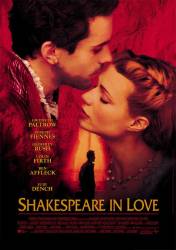Factual error: About 20 minutes in when they are at some ball/dance thing, Shakespeare's talking with a musician holding a lute. You can see fret markers on the fretboard of his lute, but these were not used on instruments until the late 1800's, early 1900's, definitely not in Shakespeare's time. (00:27:20)

Shakespeare in Love (1998)
Plot summary
Directed by: John Madden
Starring: Gwyneth Paltrow, Judi Dench, Tom Wilkinson, Geoffrey Rush, Joseph Fiennes
Young playwright, Will Shakespeare, has lost his creative muse and struggles to finish his latest play, Romeo and Ethyl, the Pirate's Daughter. His cash-strapped benefactor and owner of the Rose theatre desperately needs the play to be completed so he can pay off his ruthless creditors from the profits.
Viola De Lesseps, the daughter of a nouveau riche nobleman, passionately loves poetry and the theatre. She yearns to be an actor, but in Elizabethan England, women were forbidden to appear on the stage. While her parents are away for a month, Viola disguises herself as Thomas Kent and auditions for a part in Shakespeare's unfinished play. Impressed with Thomas' abilities, Shakespeare casts him as Romeo.
Unknown to Viola, her social-climbing father has arranged her marriage to the pompous Lord Wessex, a poor but well-titled aristocrat. "Your father should keep you better informed. He has bought me for you." Shakespeare has fallen in love with Viola, who becomes his muse. Infused with newfound inspiration, he rewrites his play into Romeo and Juliet. He soon discovers, however, that Viola is Thomas Kent. He tells no one, and they engage in a secret passionate love affair. Shakespeare neglects to mention that he is already married.
A rather horrid little boy (the future real-life playwright, John Webster) lurks about the theatre, spying on the troupe. He discovers Thomas is Viola and informs the magistrate. He and his men raid the Rose and close it, and an exposed Viola leaves in disgrace. All seems lost, but in a truly magnanimous gesture, Richard Burbage, owner of a rival theatre, the Curtain, offers his stage for Shakespeare's play.
The actor playing Juliet becomes sick and is unable to say his lines. Viola leaves her wedding carriage to attend the play and saves the show by playing Juliet. Shakespeare and Viola are able to relive their love once again as the main characters of Romeo and Juliet.
The play is a huge success and the Queen says that Shakespeare has won the wager of 50 pounds. Viola gives Shakespeare the money but has to leave with Wessex to Virginia.
Shakespeare begins to right the play The Twelfth Night that is inspired by Viola.
Queen Elizabeth: Have her then, but you're a lordly fool: she's been plucked since I saw her last, and not by you. Takes a woman to know it.
Question: How did Will not recognise Viloa in her boy disguise? Even in disguise, you can clearly see it's her, and she didn't sound like a boy.
Join the mailing list
Separate from membership, this is to get updates about mistakes in recent releases. Addresses are not passed on to any third party, and are used solely for direct communication from this site. You can unsubscribe at any time.
Check out the mistake & trivia books, on Kindle and in paperback.




Answer: In real life, Viola, of course, would be recognized as a female in disguise. However, in literature, film, opera, etc, it often is necessary to employ what is known as a "suspension of disbelief." That is, the author expects the reader or audience to know something is impossible, unlikely, or completely unreal, but they have to accept a certain premise in order to allow the plot to unfold. We go along with the idea that no one realizes Viola is actually a woman, so that we can enjoy the overall story.
raywest ★